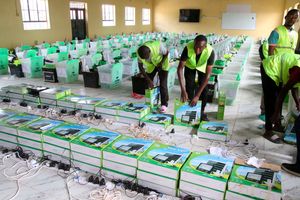Premium
Caddies ready to carry own cross but...government must approve
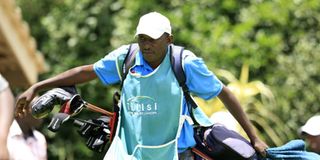
A caddie at the fist tee during Nairobi District Foursomes final between Muthaiga B and Kenya Railways at Muthaiga Golf Club on March 22, 2020.
What you need to know:
- The Union plans to engage the Ministry at the end of this month to discuss the possibility of the caddies getting back to the golf courses to work
- However realising that the caddies were going to go through a rough period given that their source of income had been taken away, the Union negotiated with the Health Ministry for them to be allowed as ball spotters usually refereed to as “forward caddies’’
- In the professional golf tours such as the European Tour, PGA Tour of America and the Sunshine Tour, pros have been allowed to use their caddies who are usually contracted employees
The agony of golfers carrying their own bags during the on-going club events may come to an end soon if the Ministry of Health will assent to a request from the Kenya Golf Union (KGU).
The Union plans to engage the Ministry at the end of this month to discuss the possibility of the caddies getting back to the golf courses to work. Outgoing KGU chairman Anthony Murage says the caddies are major stakeholders in the game of golf, and being away for the past five months has directly affected their lives through the loss of income even though a number of clubs have been assisting them by donating food items and cash.
“Most of us as clubs came together to raise funds to assist our caddies through the provision of basic groceries. This is in addition to encouraging our members to directly assist their regular caddies as consistently as possible. I believe this has gone a long way in assisting caddies who are also major stakeholders in our sport,’’ explained Murage.
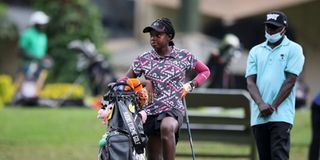
VetLab Sports Club junior golfer Chanelle Wangari pushes her trolley to the First Tee during the club's August Monthly Mug and Betika Proffessional Golfers Competition on August 8, 2020.
This followed the closure of caddie services by the Ministry of Health a few months ago because of the Covid-19. However realising that the caddies were going to go through a rough period given that their source of income had been taken away, the Union negotiated with the Health Ministry for them to be allowed as ball spotters usually refereed to as “forward caddies.’’
This was agreed by the ministry given that Covid-19 mitigating protocols were being observed in the process of ball spotting. There is however a big difference between ball spotting and caddying. A ball spotter’s role is that of showing the player the location of his or her ball, while caddying involves the caddie cleaning the players' clubs, balls and giving the player the club of his or her choice during the course of play.

VetLab Sports Club Isaac Makokha (left) who is the only Kenyan deaf and dumb golfer, chats with with fellow golfer David Evans on the 17th hole fairway during the club's June Monthly Mug on July 25, 2020.
It means, the caddie and his player will be closer most of the time in the course of the round which takes about four hours for an 18-hole round and about two hours for a nine-hole play. In the professional golf tours such as the European Tour, PGA Tour of America and the Sunshine Tour, pros have been allowed to use their caddies who are usually contracted employees.
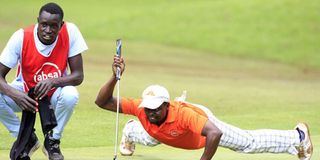
David Wakhu lines up his putt with his caddie Darren Chesumei (left) at the 18th hole green during Muthaiga Leg of Safari Tour at Muthaiga Golf Club on January 15, 2020.
Just like the players, the caddies must be Covid-19 negative during the events, meaning they will have to go through the Covid-19 procedures before they embark on their work. That will be the case during the Magical Kenya Open at Karen Country Club from November 12 to 15. It will also be the case during the KCB Karen Masters also to be held at Karen in December or early next year.
On the use of the caddie services for the Karen Masters, International Golf tournaments chairman at Karen Country Club Andy Watt, had no idea yet what the rules will be. The international tours use a bio-secure bubble but players travel with their caddies. Watt says the management will do what is safe.
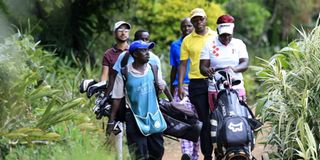
Golfers walk with their caddies on the fairway during Muthaiga Open at Muthaiga Golf Club on February 22, 2020.
It is probably easier to assign caddies for a professional player during events such as the Magical Kenya Open or the Karen Masters since a pro uses the same caddie throughout the tournament while in the club or amateur events, not many club members have permanent or regular caddies, hence the chance of a player using a different caddie in every different event.
On the other hand, the KGU boss Murage says clubs will be responsible for the Covid-19 testing of their caddies if the Ministry of Health eventually gives the go-ahead for caddie services to resume. Most of the 18-hole clubs have between 100 to 160 registered caddies though the number sometimes goes up depending on the number of players playing particularly in big and popular tournaments.





